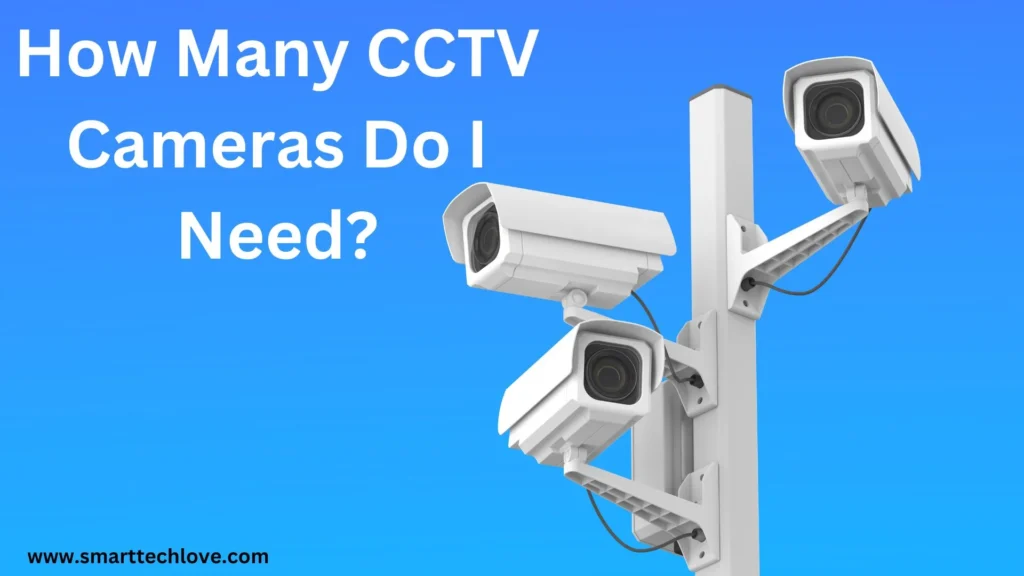The decision to install CCTV cameras is an important step in safeguarding your home, business, or property. One common question people ask is, “How many CCTV cameras do I need?”
Determining the right number of cameras is essential, as it can impact the level of security, costs, and the overall functionality of your surveillance system.
In this guide, I’ll help you navigate through the essential considerations to ensure you make the best choice for your security setup.
Why Install CCTV Cameras?
Installing CCTV cameras enhances security and peace of mind. They act as a deterrent against crime, making potential intruders think twice before targeting your property.
CCTV systems provide valuable evidence in case of incidents, helping law enforcement resolve issues more efficiently.
Additionally, many modern cameras offer remote monitoring, allowing you to keep an eye on your home or business from anywhere. Overall, CCTV cameras are a smart investment in safety and security.
Factors to Consider When Determining CCTV Camera Needs
1. Property Size and Layout
The layout and size of your property play a major role. Larger areas, complex layouts, or multi-level buildings generally require more cameras for adequate coverage.
You’ll want to ensure every entry point, hallway, and outdoor area has coverage without leaving any blind spots.
2. Type of Surveillance Needed
Different types of surveillance needs influence the number and type of cameras. For example, high-security zones may require more cameras with advanced features, while basic monitoring areas might need fewer, standard cameras.
3. Indoor vs. Outdoor Surveillance
Indoor and outdoor cameras have different requirements. Outdoor cameras must be weather-resistant and durable, while indoor cameras can focus more on discretion and clear visuals.
If you’re covering both, make sure to allocate cameras based on environmental needs.

How Many CCTV Cameras Do I Need?
The number of CCTV cameras you need depends on various factors, including the size and layout of your property, the specific areas you want to monitor, and your security requirements.
For a small home, 2 to 4 cameras may be sufficient, focusing on entry points like doors and driveways. Medium to large properties might require 4 to 8 cameras to cover multiple access points and vulnerable areas.
In commercial settings, you could need 10 or more cameras for comprehensive coverage. Ultimately, assessing your unique security needs will help you determine the right number of cameras for effective surveillance.
Final Recommendations
After assessing all these factors, I find myself with a clearer idea of how many cameras I need. Here are some general recommendations based on property types:
- Small Home (1-2 bedrooms): 2-4 cameras
- Medium Home (3-4 bedrooms): 4-6 cameras
- Large Home (5+ bedrooms): 6-10 cameras
- Small Commercial Property: 10-15 cameras
- Large Commercial Property: 15+ cameras
How Many Units Does CCTV Consume?
CCTV cameras typically consume between 10 to 15 watts each, depending on their features and capabilities.
For example, basic analog cameras use less power, while high-definition IP cameras and those with advanced features like night vision may consume more.
When planning a CCTV system, it’s essential to factor in the total power consumption of all units, as this will impact your energy costs and may require adequate power supply and wiring.
How Many GB Does CCTV Use Per Day?
The amount of data a CCTV system uses per day depends on several factors, including the camera resolution, frame rate, and whether it records continuously or only when motion is detected.
On average, a standard 1080p camera recording 24/7 can use between 60 to 100 GB per day. Higher-resolution cameras, like 4K, can consume significantly more, often exceeding 400 GB daily.
To manage storage, many systems employ compression techniques like H.264 or H.265, which can help reduce file sizes.
Frequently Asked Questions
How many CCTV cameras do I need for a small house?
Typically, 3-6 cameras are adequate for a small house. Cover the main entrance, back door, driveway, and any high-risk areas.
Is one camera enough for a small office?
One camera may cover the main entrance, but adding cameras for reception, high-value areas, and exits will provide better coverage and security.
Can CCTV cameras work without internet?
Yes, CCTV cameras can record without an internet connection if they use local storage. However, remote access and cloud storage require internet.
What resolution is best for CCTV cameras?
1080p is the standard, though 4K is preferred for detailed surveillance, especially for larger spaces or high-security areas.
Where should outdoor cameras be placed?
Focus on entry points, driveways, and perimeters. Ensure they are weather-resistant and have night vision for optimal performance.
Do CCTV cameras increase property security?
Yes, CCTV cameras act as a deterrent, help gather evidence, and monitor suspicious activities, greatly enhancing property security.
Conclusion
Deciding how many CCTV cameras to install involves careful consideration of various factors, from property size and layout to specific security needs and budget.
By evaluating these elements, I can tailor my surveillance system effectively. In the end, the goal is to ensure safety and peace of mind, whether I’m protecting my home or business.
With the right number of cameras, I can create a secure environment that suits my unique circumstances.
- How to Get Water Out of AirPods? Here’s Solution - November 21, 2024
- Are AirTags Worth It? – [Depends on You] - November 21, 2024
- How to Replace a Lost AirPod? - November 21, 2024
